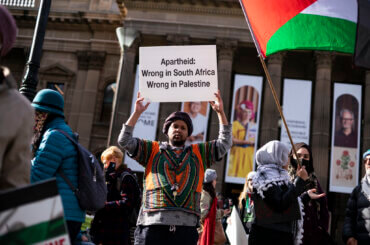This is part of Marc H. Ellis’s “Exile and the Prophetic” feature for Mondoweiss. To read the entire series visit the archive page.
When we think of protest letters, Martin Luther King’s letter from a Birmingham jail comes to mind. But there’s a tradition of protest letters to the unjust powers-that-be. Written for immediate effect, they are preserved in history and studied. These letters change the way we view the world. They call us to act for justice in our time.
Add another protest letter, from a Palestinian cleric, Reverend Naim Ateek. This one’s personal.
I first met Naim in Jerusalem in 1987 when I presented my Jewish theology of liberation. He asked me to read his manuscript on a Palestinian theology of liberation. After reading the first pages, I knew a new theological day was dawning. A Jewish and a Palestinian theology of liberation could make an impact for justice.
Naim’s book was published as the first Palestinian Uprising was in full swing. Soon after he founded Sabeel, a Christian liberation theology center, in Jerusalem. During the intifada years, Naim and I traveled the world speaking against Israeli militarism and justice for Palestinians.
Naim and I broke an important barrier. A Jewish and Palestinian theologian could work across faith and political boundaries. Jews and Palestinians could learn from one another and develop mutual respect. Together we nurture hope that one day Jews and Palestinians will be equal in the land.

What Naim and I wanted hasn’t worked out politically. The religious arena is another story. Since 1987, the churches have made great headway. This summer church divestment season is testament to how far American church folks have grown in appreciation of Palestinian life. Now prophetic Jews stand by the side of divestment supporters in the churches. The barrier Naim and I crossed is barely recognizable today. Jewish-Palestinian solidarity is taken for granted.
Perhaps that’s why Naim was so disappointed when his own Episcopal Church denied the strong resolution brought before their general convention in June. Naim’s protest letter is strident and heartbreaking. It’s also instructive.
Naim begins with a topic he and I have discussed for decades, the interfaith ecumenical deal:
I was asked to attend the General Convention as I have done a number of times in the past. I apologized, frankly because I felt deeply that under our present church leadership justice does not stand a chance. The concerns of the Bishops that masqueraded under the guise of “interfaith relations” or their “ability to reach out to people on both sides of the conflict…allowing [them] to be peacemakers” or “positive investment and not divestment” are tantamount to what we un-affectionately call “The Interfaith Ecumenical Deal.” The agreement is to have polite conversations and wonderful dinners with the Jewish establishment organizations provided we remain silent about justice for the Palestinians. The “ecumenical deal” looks impressive from the outside but in actual fact it silences the prophetic and smothers the truth.
As to the church hierarchy, Naim doesn’t mince words:
In the House of Bishops, interfaith concerns trumped justice—-again.
In debating the issues that relate to Palestine and Israel, the Bishops’ seemingly well intentioned words are clichés which the victims of injustice are sick and tired of hearing because they are simply hot air, or cries of “peace, peace, when there is no peace.” Their words are void of meaning and an insult to all those who have a sense of justice and have “eyes to see and ears to hear” the reality of the oppression of the Palestinians at the hands of the Israeli government.
Of course, this is not the first time that people that hold authority in the church and have the power to make a difference and affect change use flimsy logic so that not to act during a critical situation. Obviously the Episcopal Bishops had their reasons. However, from the perspective of the victims of injustice their silence on our conflict is perceived as betrayal. The Bishops in essence took a stand to support the status quo. They refused to see or were unwilling to respond to the dire situation on the ground.
Does the church hierarchy understand or care about the reality of Palestinian life under Israeli occupation? Naim isn’t so sure:
We as Palestinians are daily humiliated by the Israeli forces; our human rights are violated daily; our homes are demolished daily by bulldozers manufactured in the United States; our olive trees are uprooted on a daily basis; our land is confiscated and turned over into illegal settlements daily; our young people languish in Israeli jails with no legal charges or due process for months on end; our teenagers are taken from their beds in the middle of the night and imprisoned by the Israeli army on an average two by night; and the Israeli government continues its daily violations of international law while the nations of the world remain silent. Is this not a Kairos moment for the church to speak a prophetic word of justice?
Returning to theology, Naim asks two rhetorical high-stakes questions. The Bishops need to answer these questions before the Palestinian people – and God: “Who, in his or her opinion, has benefited from the bishops’ vote, the Palestinians or the Israeli government? And whom did the Episcopal Church USA protect through its vote, the oppressed or the oppressor? Naim continues in a liberationist vein:
When all is said and done, it is basically fear that prevents Bishops and governments, or for that matter anyone, from taking a stand against the rich and powerful and on behalf of the weak and marginalized. It takes strong leaders with the courage that Jesus Christ and the prophets modeled for us to champion the cause of the oppressed and that is precisely where the church must take its stand. Sadly that did not happen.
Though Naim is grateful for the “prophetic voice” of other churches like this summer’s United Church of Christ vote for divestment and last year’s stand by the Presbyterians and Quakers, his disappointment is clear. Nevertheless, Naim ends on a hopeful note:
Indeed, God continues to speak and many faithful people hear God’s call and respond to it. We are certain that the prophetic responsibility will never die and there will always be people who, in faithfulness to God and in love of neighbor will strive “…to do justice, to love mercy and to walk humbly with God.” People who have a sense of justice know that the movement of history is toward justice in the world. The words of Martin Luther King are pertinent in this regard, “The moral arc of the universe is long, but it bends toward justice,” a lesson our Episcopal bishops need to learn.
How long that moral arc of the universe is. The tradition of protest letters continues to grow, speaking justice to injustice, corruption and cowardice. Unfortunately, the lessons of these protest letters are too often lost, deflected, tucked away. There’s always an excuse for remaining silent. For sitting on the fence.
In Naim’s mind, the Episcopal Bishops acted as if the moral arc of the universe doesn’t bend toward justice.
As if the moral arc of the universe doesn’t exist.



Thanks for sharing this, Marc.
These Bishops have given the Episcopal Church a very black eye. It’s positively shameful.
“When all is said and done, it is basically fear that prevents Bishops and governments, or for that matter anyone, from taking a stand against the rich and powerful and on behalf of the weak and marginalized. It takes strong leaders with the courage that Jesus Christ and the prophets modeled for us to champion the cause of the oppressed and that is precisely where the church must take its stand. Sadly that did not happen. ”
What is this “fear” of doing what is right? Does the ‘lobby’ have influence over the church, too? I really want to know.
At any rate, it is clear that the Episcopalian Bishops don’t practice what they preach. I guess they ignored Pope Francis, too. Perhaps they need some serious study and reflection. Better yet, let their congregations be that reflection.
BBC News – 94 Yr Old ‘Auschwitz book-keeper’ Oskar Groening sentenced to four years http://www.bbc.com/news/world-europe-33533264 Will Israelis ever B held 2 account?
Episcopalian Bishops reveal why people leave that church; ditto Catholic Bishops for a long time. Seems Establishment Christian religious managers are nothing but bureaucrats.
MARC ELLIS- (quoting Naim Ateek)- “The Bishops in essence took a stand to support the status quo.”
With rare exception, organized religion has always supported the status quo and will continue to do so.
MAIN ATEEK- “It takes strong leaders with the courage that Jesus Christ and the prophets modeled for us to champion the cause of the oppressed….”
Perhaps these leaders are aware of what happened to Jesus of Nazareth and less-than-confident in their own resurrection?
(quoting MLK) – “The moral arc of the universe is long, but it bends toward justice.”
A comforting sentiment, perhaps, but is there any empirical evidence to support this? From where I am sitting, humanity is headed toward the edge of the cliff at warp speed, justice a moot point in the face of extinction.
Great article, Marc. You’ve had some excellent ones lately.